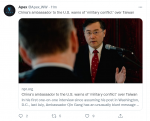You are using an out of date browser. It may not display this or other websites correctly.
You should upgrade or use an alternative browser.
You should upgrade or use an alternative browser.
WAR CHINA THREATENS TO INVADE TAIWAN
- Thread starter danielboon
- Start date
jward
passin' thru
China's ambassador to the U.S. warns of 'military conflict' over Taiwan
January 28, 20225:09 AM ET
Heard on Morning Edition

Steve Inskeep

Veteran Chinese diplomat Qin Gang, China's ambassador to the U.S., speaks with NPR's Steve Inskeep at Qin's official residence in Washington, D.C., on Thursday.
Shuran Huang for NPR
China's ambassador to the United States issued a warning Thursday: The U.S. could face "military conflict" with China over the future status of Taiwan.
In his first one-on-one interview since assuming his post in Washington, D.C., last July, Qin Gang accused Taiwan of "walking down the road toward independence," and added, "If the Taiwanese authorities, emboldened by the United States, keep going down the road for independence, it most likely will involve China and the United States, the two big countries, in a military conflict."
It was an unusually direct statement about the U.S. and Taiwan. Observers say China usually speaks in more general terms, such as saying that the U.S. is "playing with fire."

World
With U.S. focused on defense, China's trade and infrastructure sweep Southeast Asia
Though American eyes may be focused thousands of miles away toward a threatened war in Ukraine, U.S. officials and analysts have voiced increasing concern about Taiwan's ability to defend itself. This week, 39 Chinese military aircraft flew near Taiwan, the latest of several such demonstrations. It's widely believed that the U.S. would defend Taiwan in the event of war, though no formal treaty requires it to do so.
Ambassador Qin spoke of Taiwan at his official residence Thursday, where he welcomed NPR's team to discuss U.S. relations with China and the upcoming Winter Olympics in Beijing. He is a veteran diplomat who previously served as the chief of foreign affairs protocol for China's President Xi Jinping.
Qin arrived in Washington last year at a time of bipartisan disappointment with China. It's widely conceded in Washington that a decades-long policy of engagement with China produced great wealth for many companies but failed to spark democratic reform. Qin told us that any ideas of "changing China" were always "an illusion."

Qin Gang, China's ambassador to the U.S., sits for a portrait at his official residence in Washington, D.C., on Thursday.
Shuran Huang for NPR
He spoke of the upcoming Olympics with pride: "Beijing is ready." These are the second Olympic Games hosted by Beijing, with athletes and others largely living inside a secure "bubble" to protect against coronavirus infection.
A "diplomatic boycott" of the Games by U.S. officials has added tension, though only a few U.S. allies have followed suit, and U.S. athletes will compete. The U.S. announced the boycott in protest of what it terms the "ongoing genocide" of Uyghurs, a mostly Muslim minority in western China. Qin rejected such accusations as "fabrications, lies and disinformation."
He nonetheless asserted that some Uyghurs were terrorists.
"The destination for them is prisons," he said, while asserting that others had inappropriate thoughts that they were being taught to change in "vocational schools."

Politics
House OKs a bill barring imports of goods produced by forced labor of Uyghurs in China
NPR correspondents have documented widespread imprisonment of Uyghurs, as well as efforts to turn them away from their language and culture. NPR has also reported a security architecture in the western province of Xinjiang that is even more intense than in other regions of China, with cameras and police stations that are nearly ubiquitous.
The U.S. has become more vocal in defense of Uyghurs as overall relations have soured. If either side hoped for a reset in relations after the departure of President Donald Trump, it hasn't quite happened. President Biden has yet to remove Trump's tariffs on Chinese goods, and U.S. diplomats have traded contentious statements with their Chinese counterparts.

China's Ambassador to the U.S. Qin Gang called Taiwan "the biggest tinderbox" among irritants in the relationship between his country and the U.S.
Shuran Huang for NPR
Of the many irritants in the relationship, the ambassador described Taiwan as "the biggest tinderbox." The region has governed itself separately for generations. Unlike the rest of China, Taiwan was not conquered by Communist forces in the civil war that led to the declaration of the People's Republic of China in 1949. The former government took refuge there and, with U.S. support, eventually developed a democratic system.
Beijing has long sought unification with Taiwan and has not renounced the use of force to meet that goal. The U.S. has said it expects the matter to be settled peacefully.
"People on both sides of the Taiwan Straits are Chinese," Qin said, arguing that his government has no desire for war. However, in a sharp rebuff of any effort by Taiwan's government to formally declare independence, he said, "China will not commit to giving up the un-peaceful means for reunification because this is a deterrent."
Even so, Qin said China's "most important relationship" is with the United States, and he gave a straightforward description of his mission in Washington: "Don't mess it up."
Interview highlights
On whether Americans should be concerned about a Chinese attack on Taiwan:
"The Taiwan issue is the biggest tinderbox between China and the United States. If, you know the Taiwanese authorities, emboldened by the United States, you know, keep going down the road for independence, it most likely will involve China and the United States, the two big countries, in the military conflict."
On the prospect of military conflict:
"People on both sides of Taiwan Straits are Chinese, so we are compatriots. So the last thing we should do is to fight with compatriots. And we will do our utmost in the greatest sincerity to achieve a peaceful reunification. ... But ... that Taiwanese authority is working down the road towards independence, emboldened by the United States. So China will not commit to giving up the un-peaceful means for reunification because this is a deterrence."
On policies and human rights abuses against mostly Muslim Uyghur populations in western China that prompted the U.S. diplomatic boycott of the Olympics in Beijing:
"The actual condition is that Uyghur people as other ethnic groups of people, they enjoy happy life. They enjoy the rights and the freedom guaranteed by the constitution of China. They are a member of the big family of Chinese nation. This co-called genocide or forced labor — these are big lies of the century. There's no genocide at all."
On whether Chinese President Xi Jinping believes America's global status is in decline:
"Nobody in China bet(s) against the United States. Everybody in China, including the Chinese leadership, believe(s) that the United States is one of the most important countries. And the relationship between China and United States is the most important relationship. We must work well at 'don't mess it up.' "

 www.npr.org
www.npr.org
January 28, 20225:09 AM ET
Heard on Morning Edition

Steve Inskeep

Veteran Chinese diplomat Qin Gang, China's ambassador to the U.S., speaks with NPR's Steve Inskeep at Qin's official residence in Washington, D.C., on Thursday.
Shuran Huang for NPR
China's ambassador to the United States issued a warning Thursday: The U.S. could face "military conflict" with China over the future status of Taiwan.
In his first one-on-one interview since assuming his post in Washington, D.C., last July, Qin Gang accused Taiwan of "walking down the road toward independence," and added, "If the Taiwanese authorities, emboldened by the United States, keep going down the road for independence, it most likely will involve China and the United States, the two big countries, in a military conflict."
It was an unusually direct statement about the U.S. and Taiwan. Observers say China usually speaks in more general terms, such as saying that the U.S. is "playing with fire."

World
With U.S. focused on defense, China's trade and infrastructure sweep Southeast Asia
Though American eyes may be focused thousands of miles away toward a threatened war in Ukraine, U.S. officials and analysts have voiced increasing concern about Taiwan's ability to defend itself. This week, 39 Chinese military aircraft flew near Taiwan, the latest of several such demonstrations. It's widely believed that the U.S. would defend Taiwan in the event of war, though no formal treaty requires it to do so.
Ambassador Qin spoke of Taiwan at his official residence Thursday, where he welcomed NPR's team to discuss U.S. relations with China and the upcoming Winter Olympics in Beijing. He is a veteran diplomat who previously served as the chief of foreign affairs protocol for China's President Xi Jinping.
Qin arrived in Washington last year at a time of bipartisan disappointment with China. It's widely conceded in Washington that a decades-long policy of engagement with China produced great wealth for many companies but failed to spark democratic reform. Qin told us that any ideas of "changing China" were always "an illusion."

Qin Gang, China's ambassador to the U.S., sits for a portrait at his official residence in Washington, D.C., on Thursday.
Shuran Huang for NPR
He spoke of the upcoming Olympics with pride: "Beijing is ready." These are the second Olympic Games hosted by Beijing, with athletes and others largely living inside a secure "bubble" to protect against coronavirus infection.
A "diplomatic boycott" of the Games by U.S. officials has added tension, though only a few U.S. allies have followed suit, and U.S. athletes will compete. The U.S. announced the boycott in protest of what it terms the "ongoing genocide" of Uyghurs, a mostly Muslim minority in western China. Qin rejected such accusations as "fabrications, lies and disinformation."
He nonetheless asserted that some Uyghurs were terrorists.
"The destination for them is prisons," he said, while asserting that others had inappropriate thoughts that they were being taught to change in "vocational schools."

Politics
House OKs a bill barring imports of goods produced by forced labor of Uyghurs in China
NPR correspondents have documented widespread imprisonment of Uyghurs, as well as efforts to turn them away from their language and culture. NPR has also reported a security architecture in the western province of Xinjiang that is even more intense than in other regions of China, with cameras and police stations that are nearly ubiquitous.
The U.S. has become more vocal in defense of Uyghurs as overall relations have soured. If either side hoped for a reset in relations after the departure of President Donald Trump, it hasn't quite happened. President Biden has yet to remove Trump's tariffs on Chinese goods, and U.S. diplomats have traded contentious statements with their Chinese counterparts.

China's Ambassador to the U.S. Qin Gang called Taiwan "the biggest tinderbox" among irritants in the relationship between his country and the U.S.
Shuran Huang for NPR
Of the many irritants in the relationship, the ambassador described Taiwan as "the biggest tinderbox." The region has governed itself separately for generations. Unlike the rest of China, Taiwan was not conquered by Communist forces in the civil war that led to the declaration of the People's Republic of China in 1949. The former government took refuge there and, with U.S. support, eventually developed a democratic system.
Beijing has long sought unification with Taiwan and has not renounced the use of force to meet that goal. The U.S. has said it expects the matter to be settled peacefully.
"People on both sides of the Taiwan Straits are Chinese," Qin said, arguing that his government has no desire for war. However, in a sharp rebuff of any effort by Taiwan's government to formally declare independence, he said, "China will not commit to giving up the un-peaceful means for reunification because this is a deterrent."
Even so, Qin said China's "most important relationship" is with the United States, and he gave a straightforward description of his mission in Washington: "Don't mess it up."
Interview highlights
On whether Americans should be concerned about a Chinese attack on Taiwan:
"The Taiwan issue is the biggest tinderbox between China and the United States. If, you know the Taiwanese authorities, emboldened by the United States, you know, keep going down the road for independence, it most likely will involve China and the United States, the two big countries, in the military conflict."
On the prospect of military conflict:
"People on both sides of Taiwan Straits are Chinese, so we are compatriots. So the last thing we should do is to fight with compatriots. And we will do our utmost in the greatest sincerity to achieve a peaceful reunification. ... But ... that Taiwanese authority is working down the road towards independence, emboldened by the United States. So China will not commit to giving up the un-peaceful means for reunification because this is a deterrence."
On policies and human rights abuses against mostly Muslim Uyghur populations in western China that prompted the U.S. diplomatic boycott of the Olympics in Beijing:
"The actual condition is that Uyghur people as other ethnic groups of people, they enjoy happy life. They enjoy the rights and the freedom guaranteed by the constitution of China. They are a member of the big family of Chinese nation. This co-called genocide or forced labor — these are big lies of the century. There's no genocide at all."
On whether Chinese President Xi Jinping believes America's global status is in decline:
"Nobody in China bet(s) against the United States. Everybody in China, including the Chinese leadership, believe(s) that the United States is one of the most important countries. And the relationship between China and United States is the most important relationship. We must work well at 'don't mess it up.' "

China's ambassador to the U.S. warns of 'military conflict' over Taiwan
In his first one-on-one interview since assuming his post in Washington, D.C., last July, Ambassador Qin Gang has an unusually blunt message for the U.S.
So how many people are going to end up dying because the CCP can't leave well enough alone?
I don’t have the energy to count that high…. They are efficient in killing people, however…
OA
I don’t have the energy to count that high…. They are efficient in killing people, however…
OA
We're all efficient at killing people once the decision is finally made, the tools already exist. It is only a matter of "leadership" mentally crossing the Rubicon.
jward
passin' thru

zerohedg
@zerohedge
1h
Taiwan Says Its Athletes Will Not Participate In Beijing Olympics Ceremonies
View: https://twitter.com/zerohedge/status/1487614124477591555?s=20&t=L9tS2g5k1ptSsbRVgkV50A
jward
passin' thru

Ken Moriyasu
@kenmoriyasu
Prof. Jin Canrong to Nikkei:
— It is very likely that China will unify Taiwan by force by 2027
— China already has the capability to unify Taiwan within one week
— The PLA can defeat any U.S. force within 1,000 nautical miles of the coastline
— Japan should absolutely not intervene in a Taiwanese emergency
— The U.S. already cannot win against China on this. If Japan intervenes, China will have no choice but to defeat Japan as well
— Japan must realize that a new change is occurring
View: https://twitter.com/kenmoriyasu/status/1487900143299014658?s=20&t=lRKf_ObyCfYlR8TRn5h3pA
jward
passin' thru
Indo-Pacific News - Watching the CCP-China Threat@IndoPac_Info·15m
1/ #Ukraine Is a Distraction From #Taiwan
Getting bogged down in #Europe will impede the #US’s ability to compete with #China in the Pacific.
The U.S. has no hope of competing with China and ensuring Taiwan’s defense if it is distracted elsewhere.
View: https://twitter.com/IndoPac_Info/status/1493057031284019202?s=20&t=Am06uwqAFBE1I9z-pWiOvQ
The U.S. can no longer afford to spread its military across the world.
There is a viable alternative for Europe’s defense: The Europeans themselves can step up and do more for themselves, especially with regard to conventional arms.
This is well within Europe’s capacity, as the combined economic power of the NATO states dwarfs that of Russia. NATO allies spend far more on their militaries than Russia.
Denying China the ability to dominate Asia is more important than anything that happens in Europe.
1/ #Ukraine Is a Distraction From #Taiwan
Getting bogged down in #Europe will impede the #US’s ability to compete with #China in the Pacific.
The U.S. has no hope of competing with China and ensuring Taiwan’s defense if it is distracted elsewhere.
View: https://twitter.com/IndoPac_Info/status/1493057031284019202?s=20&t=Am06uwqAFBE1I9z-pWiOvQ
The U.S. can no longer afford to spread its military across the world.
There is a viable alternative for Europe’s defense: The Europeans themselves can step up and do more for themselves, especially with regard to conventional arms.
This is well within Europe’s capacity, as the combined economic power of the NATO states dwarfs that of Russia. NATO allies spend far more on their militaries than Russia.
Denying China the ability to dominate Asia is more important than anything that happens in Europe.
jward
passin' thru
Reuters Asia
Taiwan says Chinese plane flew close to remote island Taiwan says Chinese plane flew close to remote island
View: https://twitter.com/ReutersAsia/status/1493438702193889282?s=20&t=i9BIPAQx5Dx8IvEcrECi4Q
Taiwan says Chinese plane flew close to remote island Taiwan says Chinese plane flew close to remote island
View: https://twitter.com/ReutersAsia/status/1493438702193889282?s=20&t=i9BIPAQx5Dx8IvEcrECi4Q
jward
passin' thru
only 2.
國防部 Ministry of National Defense, R.O.C.
2 PLA aircraft (Y-8 ASW and J-16) entered #Taiwan’s southwest ADIZ on February 14, 2022. Please check our official website for more information: 中華民國國防部-全球資訊網-即時軍事動態
View: https://twitter.com/MoNDefense/status/1493184542500618245?s=20&t=i9BIPAQx5Dx8IvEcrECi4Q
國防部 Ministry of National Defense, R.O.C.
2 PLA aircraft (Y-8 ASW and J-16) entered #Taiwan’s southwest ADIZ on February 14, 2022. Please check our official website for more information: 中華民國國防部-全球資訊網-即時軍事動態
View: https://twitter.com/MoNDefense/status/1493184542500618245?s=20&t=i9BIPAQx5Dx8IvEcrECi4Q
jward
passin' thru
Taiwan rebukes China for using Games to push 'political propaganda'
February 18, 202211:02 PM CSTLast Updated an hour ago
3-4 minutes
2022 Beijing Olympics - Freestyle Skiing - Men's Freeski Slopestyle - Final - Training - Genting Snow Park, Zhangjiakou, China - February 16, 2022. The Olympic logo is pictured frozen on a signboard. REUTERS/Mike Blake
TAIPEI, Feb 18 (Reuters) - Taiwan's government rebuked China on Friday for using the Beijing Winter Olympics to assert its sovereignty claims over the island, saying the country had "cast a shadow" over the peaceful spirit of the event to spread "propaganda".
China views self-governed Taiwan as its own territory, and it competes at the Olympics and most other international sports events as "Chinese Taipei" at Beijing's insistence.
Beijing Games spokesperson Yan Jiarong said on Thursday that "There is only one China", referring to the country's long-held stance that Taiwan belongs to China.
Taiwan's Foreign Ministry said the official had "openly used the Olympic venue to conduct improper political propaganda", running contrary the Olympics Charter on not politicising the Games.
The ministry said Taiwan is Taiwan, only its democratically elected government can represent its people in the world, and it takes part in the Olympics in its own right not as part of another country.
The Chinese official's comments had "cast a shadow over the peaceful spirit embodied by the Olympic Rings", it said.
International Olympic Committee (IOC) President Thomas Bach, speaking earlier on Friday, said they had spoken to the Beijing organisers about the remarks immediately after the news conference where they were made.
Both the organisers and the IOC "have restated their unequivocal commitment to remain politically neutral as it is required by the Olympic Charter", Bach said.
The Chinese organisers said in response, via an emailed statement, that "Beijing 2022 complies with the provisions of the Host City Contract and the Olympic Charter and opposes the politicisation of sports".
The spat over Taiwan, which has four athletes at the Winter Games, comes as China has stepped up efforts to limit the island's international participation to force it to accept Chinese rule.
Taiwan took part in the Games' opening ceremony after the team said it had received "several notices" by the IOC to attend both the opening and closing ceremonies.
Last month, it had initially said it could not attend due to delayed flights and COVID-19 rules.
Reporting by Ben Blanchard; Additional reporting by Tony Munroe in Beijing Editing by Christian Radnedge and Philippa Fletcher
/cloudfront-us-east-2.images.arcpublishing.com/reuters/LMNUPA4U6FMIPLFUKE67MCJTOM.jpg)
 www.reuters.com
www.reuters.com
February 18, 202211:02 PM CSTLast Updated an hour ago
3-4 minutes
2022 Beijing Olympics - Freestyle Skiing - Men's Freeski Slopestyle - Final - Training - Genting Snow Park, Zhangjiakou, China - February 16, 2022. The Olympic logo is pictured frozen on a signboard. REUTERS/Mike Blake
TAIPEI, Feb 18 (Reuters) - Taiwan's government rebuked China on Friday for using the Beijing Winter Olympics to assert its sovereignty claims over the island, saying the country had "cast a shadow" over the peaceful spirit of the event to spread "propaganda".
China views self-governed Taiwan as its own territory, and it competes at the Olympics and most other international sports events as "Chinese Taipei" at Beijing's insistence.
Beijing Games spokesperson Yan Jiarong said on Thursday that "There is only one China", referring to the country's long-held stance that Taiwan belongs to China.
Taiwan's Foreign Ministry said the official had "openly used the Olympic venue to conduct improper political propaganda", running contrary the Olympics Charter on not politicising the Games.
The ministry said Taiwan is Taiwan, only its democratically elected government can represent its people in the world, and it takes part in the Olympics in its own right not as part of another country.
The Chinese official's comments had "cast a shadow over the peaceful spirit embodied by the Olympic Rings", it said.
International Olympic Committee (IOC) President Thomas Bach, speaking earlier on Friday, said they had spoken to the Beijing organisers about the remarks immediately after the news conference where they were made.
Both the organisers and the IOC "have restated their unequivocal commitment to remain politically neutral as it is required by the Olympic Charter", Bach said.
The Chinese organisers said in response, via an emailed statement, that "Beijing 2022 complies with the provisions of the Host City Contract and the Olympic Charter and opposes the politicisation of sports".
The spat over Taiwan, which has four athletes at the Winter Games, comes as China has stepped up efforts to limit the island's international participation to force it to accept Chinese rule.
Taiwan took part in the Games' opening ceremony after the team said it had received "several notices" by the IOC to attend both the opening and closing ceremonies.
Last month, it had initially said it could not attend due to delayed flights and COVID-19 rules.
Reporting by Ben Blanchard; Additional reporting by Tony Munroe in Beijing Editing by Christian Radnedge and Philippa Fletcher
/cloudfront-us-east-2.images.arcpublishing.com/reuters/LMNUPA4U6FMIPLFUKE67MCJTOM.jpg)
Taiwan rebukes China for using Games to push 'political propaganda'
Taiwan's government rebuked China on Friday for using the Beijing Winter Olympics to assert its sovereignty claims over the island, saying the country had "cast a shadow" over the peaceful spirit of the event to spread "propaganda".
Knoxville's Joker
Has No Life - Lives on TB
Taiwan is the former location of the Dutch controlled colony. It is also where the Republic of China fled after 1949. Taking Taiwan is the last straw that the People's Republic of China (PRC) needs to conquer to consider their country unified. The problem is that the west needs Taiwan as a counter to Beijing's laughable leadership. Start expecting to see satellite black outs after the olympics as all sides and all european countries decide that the PRC needs to leave Taiwan alone. But the other kicker is China is playing a time game. The longer they wait the harder it will be for them to field troops as soldiers age out.
jward
passin' thru
China / Military
Taiwan reveals plans for live-fire drills at islets near Chinese mainland

Lawrence Chung
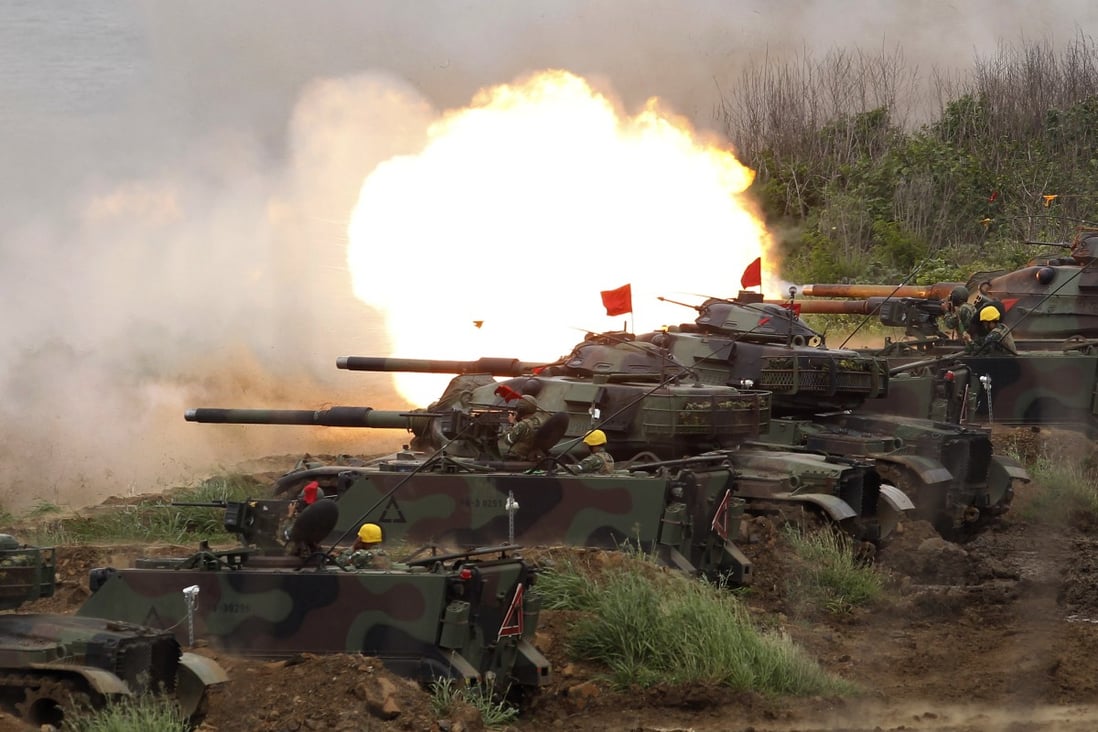
The islet of Penghu is to stage some of Taiwan’s planned live-fire drills. Photo: AP
Taiwan will stage a series of live-fire drills next month at several islets under its control, including two close to the Chinese mainland, to test the combat readiness of its forces there.
The drills come amid growing concerns that cross-strait conflict could become imminent if the mainland’s People’s Liberation Army (PLA) were to seize one of the islets to force self-ruled Taiwan to the table for reunification talks.
According to notices issued by the island’s armed forces to alert ships and planes not to approach the live-fire sites, Taiwan’s artillery, missile and other troops stationed in Dongyin, Quemoy (also known as Kinmen) and Penghu (also called the Pescadores) will stage the exercises on March 16 and 17.
Under the plan, the drills will run in the morning and at night, simulating scenarios in which warplanes and amphibious landing craft attack the islets.
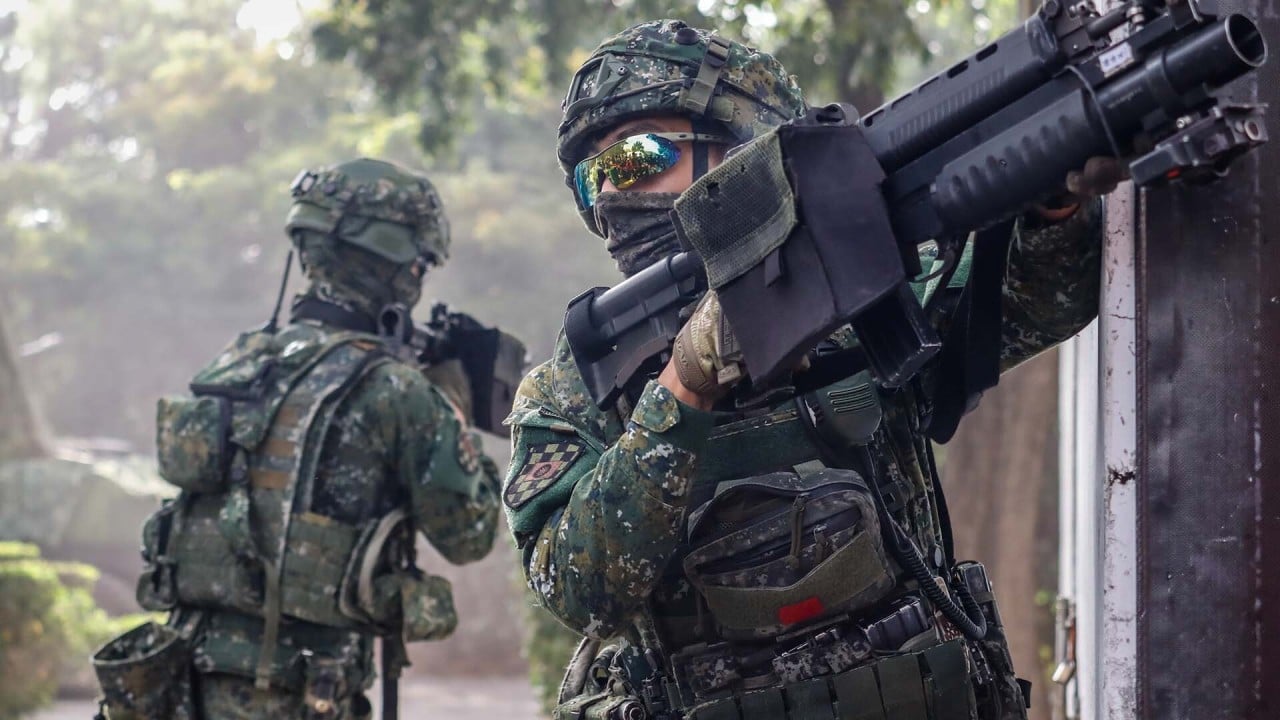
02:19
Taiwan holds urban, aerial combat drills amid threats of invasion by mainland China
Taiwan holds urban, aerial combat drills amid threats of invasion by mainland China
Dongyin and Quemoy are frontline islets situated close to the mainland cities of Fuzhou and Xiamen, respectively. Penghu is midway between the mainland Chinese province of Fujian and the Taiwanese city of Chiayi.
Taiwan has deployed a large number of missiles to the three islands, including locally developed Tien Kung (Sky Bow) surface-to-air ballistic missiles, Hsiung Feng (Brave Wind) anti-ship missiles and Wan Chien (Ten Thousand Swords) air-to-ground subsonic cruise missiles, in addition to powerful cannons and other weapons.
The island is expected to take delivery of a batch of Harpoon anti-ship missiles from the US later this year and deploy them on Penghu.
The Taiwanese coastguard also said it would stage annual live-fire drills on March 26 and 31 at the Pratas Islands (known in Chinese as the Dongsha Islands), shooting at the sea and air from the South China Sea islet.
These islands, which lie 450km (280 miles) southwest of the Taiwanese port city of Kaohsiung, have been seen by some experts as one of the most feasible targets for attack by the PLA, which is believed to prefer to seize the islet cluster to force the Taiwanese to the table without having to launch an all-out war.
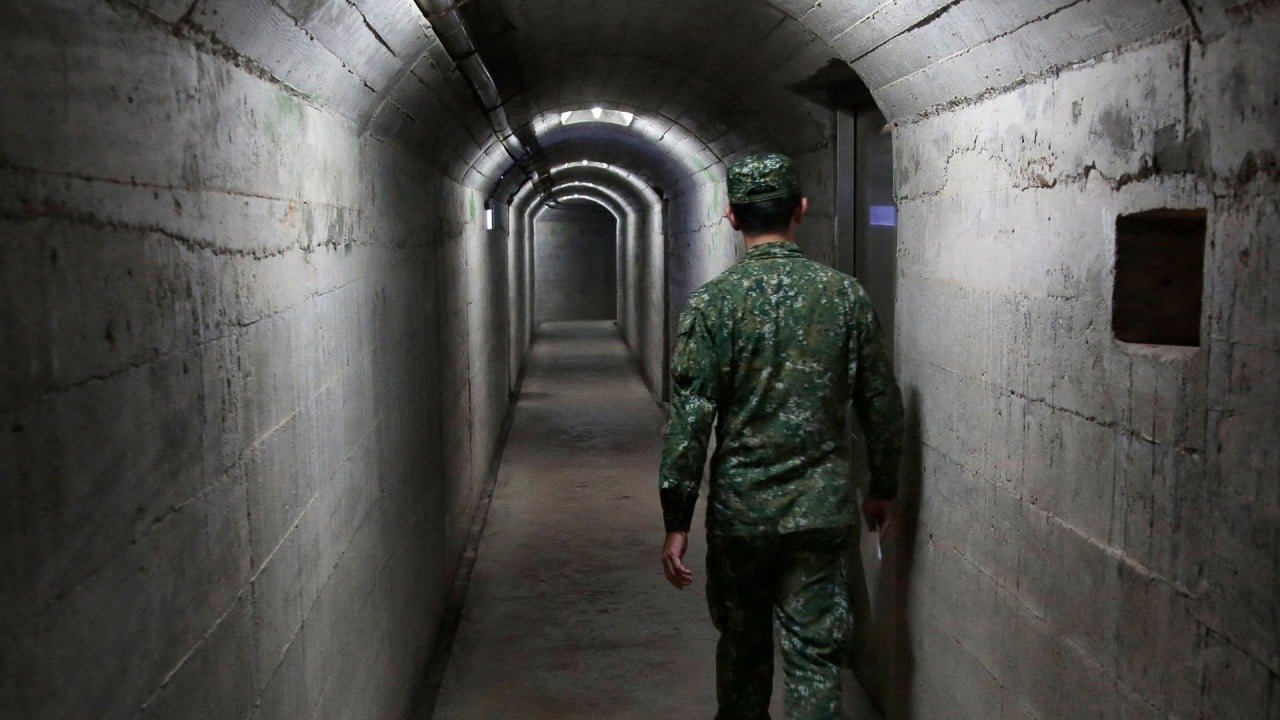
00:00
War scarred bunkers on Quemoy reflect the islands’ frontline role in Taiwan Strait tension
War scarred bunkers on Quemoy reflect the islands’ frontline role in Taiwan Strait tension
The coastguard officers, who are to be joined by troops from the Taiwan Marine Corps’ 99th brigade, are expected to test-fire the Kestrel rockets used for repelling amphibious landing craft and any assault by sea, as they did in previous annual live-fire drills.
The rockets have a range of 400 metres (1,300 feet) and can be fitted with warheads capable of piercing the surface of a tank or a 30cm-thick concrete wall.
Previous drills also included the coastguard test-firing weapons such as 120mm (five-inch) mortars, 40mm guns and 20mm cannons.
Taiwanese commentator Arthur Chi said Dongsha was strategically more important than Taiwan’s other defence outposts, given its access to the Taiwan Strait, Bashi Channel, the mainland-controlled Paracel Islands (called the Xisha Islands by Beijing) and the South China Sea.
“If the Chinese communists plan to attack Taiwan, they are likely to first take control of Dongsha before launching an all-out strike against Penghu and Taiwan proper,” he said, adding that Beijing could use a move on the islet to intimidate Taiwan into agreeing to negotiate.
Cross-strait tension has shown no sign of abating in recent years after Beijing suspended official talks and exchanges with Taipei.
Taiwan deploys its most advanced F-16V fighter jets amid rising military tensions with Beijing
Beijing considers Taiwan a breakaway province that must be taken under its control, by force if necessary. It has sent a flurry of warplanes to Taiwan’s air defence identification zone almost daily and staged war games nearby to ramp up pressure on Taipei, aiming to force Tsai Ing-wen, the island’s independence-leaning president, to accept the one-China principle and agree to talks.
On February 5, a mainland civilian plane – a Y-12 transport plane – was reported to have flown very close to Dongyin, a frontline islet in Taiwan’s Matsu Island cluster, which is 16km from Fuzhou on the mainland coast.
A week later, Taiwanese media reported that a mainland J-16 fighter jet had flown close to Pratas Island, Taiwan’s southernmost outpost.
Taiwan’s defence ministry confirmed that the civilian plane did fly close to Dongyin, possibly to test surveillance systems and defence alertness, but it rejected the reports about the fighter jet.
Ministry spokesman Shih Shun-wen said the military would step up combat preparations and improve surveillance systems on the islets, but said the live-fire drills had been “scheduled well ahead” of the fly-bys.
posted for fair use
videos at source
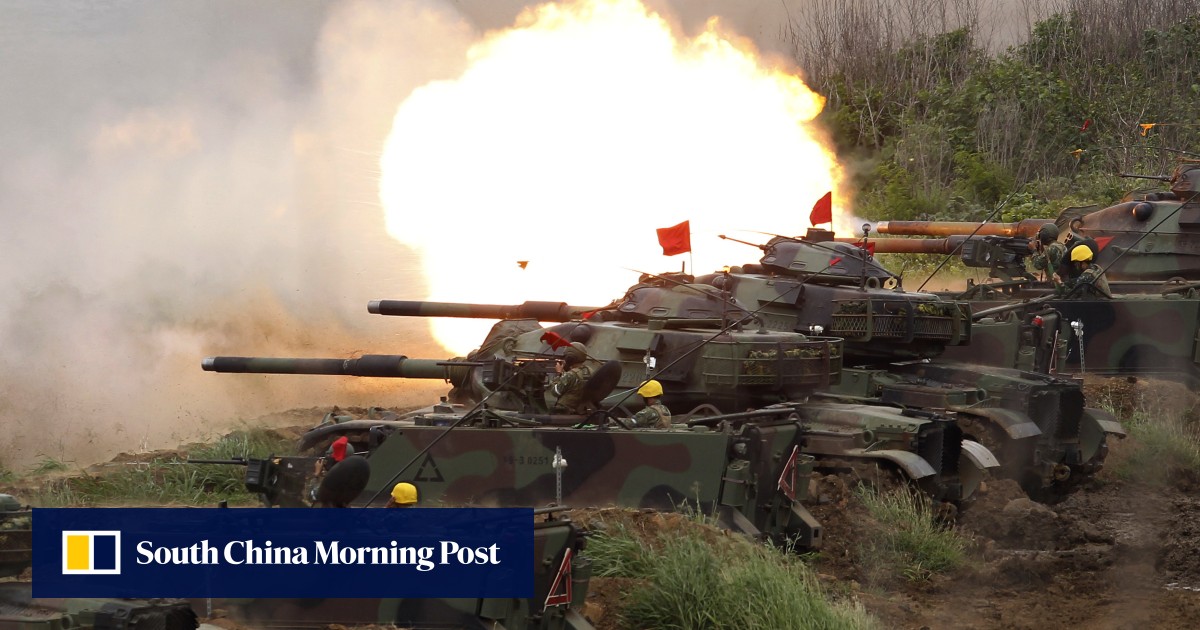
 www.scmp.com
www.scmp.com
Taiwan reveals plans for live-fire drills at islets near Chinese mainland
- Drills to include islets of Dongyin and Quemoy, close to mainland cities of Fuzhou and Xiamen, and will simulate repelling an invasion
- Some observers believe the mainland is more likely to try to seize one of the islets, to force talks, than launch an all-out war

Lawrence Chung

The islet of Penghu is to stage some of Taiwan’s planned live-fire drills. Photo: AP
Taiwan will stage a series of live-fire drills next month at several islets under its control, including two close to the Chinese mainland, to test the combat readiness of its forces there.
The drills come amid growing concerns that cross-strait conflict could become imminent if the mainland’s People’s Liberation Army (PLA) were to seize one of the islets to force self-ruled Taiwan to the table for reunification talks.
According to notices issued by the island’s armed forces to alert ships and planes not to approach the live-fire sites, Taiwan’s artillery, missile and other troops stationed in Dongyin, Quemoy (also known as Kinmen) and Penghu (also called the Pescadores) will stage the exercises on March 16 and 17.
Under the plan, the drills will run in the morning and at night, simulating scenarios in which warplanes and amphibious landing craft attack the islets.

02:19
Taiwan holds urban, aerial combat drills amid threats of invasion by mainland China
Taiwan holds urban, aerial combat drills amid threats of invasion by mainland China
Dongyin and Quemoy are frontline islets situated close to the mainland cities of Fuzhou and Xiamen, respectively. Penghu is midway between the mainland Chinese province of Fujian and the Taiwanese city of Chiayi.
Taiwan has deployed a large number of missiles to the three islands, including locally developed Tien Kung (Sky Bow) surface-to-air ballistic missiles, Hsiung Feng (Brave Wind) anti-ship missiles and Wan Chien (Ten Thousand Swords) air-to-ground subsonic cruise missiles, in addition to powerful cannons and other weapons.
The island is expected to take delivery of a batch of Harpoon anti-ship missiles from the US later this year and deploy them on Penghu.
The Taiwanese coastguard also said it would stage annual live-fire drills on March 26 and 31 at the Pratas Islands (known in Chinese as the Dongsha Islands), shooting at the sea and air from the South China Sea islet.
These islands, which lie 450km (280 miles) southwest of the Taiwanese port city of Kaohsiung, have been seen by some experts as one of the most feasible targets for attack by the PLA, which is believed to prefer to seize the islet cluster to force the Taiwanese to the table without having to launch an all-out war.

00:00
War scarred bunkers on Quemoy reflect the islands’ frontline role in Taiwan Strait tension
War scarred bunkers on Quemoy reflect the islands’ frontline role in Taiwan Strait tension
The coastguard officers, who are to be joined by troops from the Taiwan Marine Corps’ 99th brigade, are expected to test-fire the Kestrel rockets used for repelling amphibious landing craft and any assault by sea, as they did in previous annual live-fire drills.
The rockets have a range of 400 metres (1,300 feet) and can be fitted with warheads capable of piercing the surface of a tank or a 30cm-thick concrete wall.
Previous drills also included the coastguard test-firing weapons such as 120mm (five-inch) mortars, 40mm guns and 20mm cannons.
Taiwanese commentator Arthur Chi said Dongsha was strategically more important than Taiwan’s other defence outposts, given its access to the Taiwan Strait, Bashi Channel, the mainland-controlled Paracel Islands (called the Xisha Islands by Beijing) and the South China Sea.
“If the Chinese communists plan to attack Taiwan, they are likely to first take control of Dongsha before launching an all-out strike against Penghu and Taiwan proper,” he said, adding that Beijing could use a move on the islet to intimidate Taiwan into agreeing to negotiate.
Cross-strait tension has shown no sign of abating in recent years after Beijing suspended official talks and exchanges with Taipei.
Taiwan deploys its most advanced F-16V fighter jets amid rising military tensions with Beijing
Beijing considers Taiwan a breakaway province that must be taken under its control, by force if necessary. It has sent a flurry of warplanes to Taiwan’s air defence identification zone almost daily and staged war games nearby to ramp up pressure on Taipei, aiming to force Tsai Ing-wen, the island’s independence-leaning president, to accept the one-China principle and agree to talks.
On February 5, a mainland civilian plane – a Y-12 transport plane – was reported to have flown very close to Dongyin, a frontline islet in Taiwan’s Matsu Island cluster, which is 16km from Fuzhou on the mainland coast.
A week later, Taiwanese media reported that a mainland J-16 fighter jet had flown close to Pratas Island, Taiwan’s southernmost outpost.
Taiwan’s defence ministry confirmed that the civilian plane did fly close to Dongyin, possibly to test surveillance systems and defence alertness, but it rejected the reports about the fighter jet.
Ministry spokesman Shih Shun-wen said the military would step up combat preparations and improve surveillance systems on the islets, but said the live-fire drills had been “scheduled well ahead” of the fly-bys.
posted for fair use
videos at source

Taiwan reveals plans for live-fire drills at islets near Chinese mainland
Some observers believe the mainland is more likely to try to seize one of the islets, to force talks, than launch an all-out war.
jward
passin' thru
Mike Pompeo, who riled China while in office, to visit Taiwan
February 21, 20221:50 AM CSTLast Updated 3 min ago
2-3 minutes
U.S. Secretary of State Mike Pompeo gives a news conference about dealings with China and Iran, and on the fight against the coronavirus disease (COVID-19) pandemic, in Washington, U.S., June 24, 2020. Mangel Ngan/Pool via REUTERS/File Photo
TAIPEI, Feb 21 (Reuters) - Former U.S. Secretary of State Mike Pompeo, who riled China while in office with his criticism of it and attacks on its ruling Communist Party, will visit Taiwan next week and meet President Tsai Ing-wen, the Taiwan government said on Monday.
Pompeo served under then-President Donald Trump from 2018 until the end of the administration in January last year.
Taiwan's foreign ministry said Pompeo and his wife would visit the Chinese-claimed island from March 3-5, and also meet Foreign Minister Joseph Wu and give a speech at a think-tank.
"Former Secretary of State Pompeo is a long-term and staunch friend of Taiwan and made outstanding contributions to promoting Taiwan-U.S. relations during his time in office," the ministry said in a statement.
His visit shows the bipartisan "rock solid" U.S. support for Taiwan and the close Taiwan-U.S. friendship, it added.
The Trump administration gave strong backing to Taiwan, despite the lack of formal diplomatic ties, including high profile arms sales and visits of top U.S. officials to Taipei.
Pompeo particularly angered Beijing with his attacks on the Communist Party.
China has stepped up its military and diplomatic pressure against Taiwan over the past two years seeking to force the island to accept its sovereignty.
Taiwan's government says it wants peace but will defend itself if attacked, and that only the island's people have the right to decide their future.
/cloudfront-us-east-2.images.arcpublishing.com/reuters/VRLPD44CM5OKTF6RUEOQTIL6QU.jpg)
 www.reuters.com
www.reuters.com
February 21, 20221:50 AM CSTLast Updated 3 min ago
2-3 minutes
U.S. Secretary of State Mike Pompeo gives a news conference about dealings with China and Iran, and on the fight against the coronavirus disease (COVID-19) pandemic, in Washington, U.S., June 24, 2020. Mangel Ngan/Pool via REUTERS/File Photo
TAIPEI, Feb 21 (Reuters) - Former U.S. Secretary of State Mike Pompeo, who riled China while in office with his criticism of it and attacks on its ruling Communist Party, will visit Taiwan next week and meet President Tsai Ing-wen, the Taiwan government said on Monday.
Pompeo served under then-President Donald Trump from 2018 until the end of the administration in January last year.
Taiwan's foreign ministry said Pompeo and his wife would visit the Chinese-claimed island from March 3-5, and also meet Foreign Minister Joseph Wu and give a speech at a think-tank.
"Former Secretary of State Pompeo is a long-term and staunch friend of Taiwan and made outstanding contributions to promoting Taiwan-U.S. relations during his time in office," the ministry said in a statement.
His visit shows the bipartisan "rock solid" U.S. support for Taiwan and the close Taiwan-U.S. friendship, it added.
The Trump administration gave strong backing to Taiwan, despite the lack of formal diplomatic ties, including high profile arms sales and visits of top U.S. officials to Taipei.
Pompeo particularly angered Beijing with his attacks on the Communist Party.
China has stepped up its military and diplomatic pressure against Taiwan over the past two years seeking to force the island to accept its sovereignty.
Taiwan's government says it wants peace but will defend itself if attacked, and that only the island's people have the right to decide their future.
/cloudfront-us-east-2.images.arcpublishing.com/reuters/VRLPD44CM5OKTF6RUEOQTIL6QU.jpg)
U.S. former top diplomat Pompeo, sanctioned by China, to visit Taiwan
Former U.S. Secretary of State Mike Pompeo, placed under sanctions by China when he left office at the end of the Trump presidency last year, will visit Taiwan next week and meet President Tsai Ing-wen, Taiwan's government said on Monday.
jward
passin' thru
First Squawk
@FirstSquawk
17m
China to take measures against US over sale of weapons to Taiwan - Foreign Ministry
@FirstSquawk
17m
China to take measures against US over sale of weapons to Taiwan - Foreign Ministry
danielboon
TB Fanatic
EndGameWW3 Retweeted

CSIS
@CSIS
·
7m
Tensions in the Taiwan Strait raise a critical national security question: under what conditions do gray zone campaigns escalate?
@csis_isp
explores dynamics in China’s gray zone campaign targeting Taiwan through the results of 20 crisis simulations. http://cs.is/3oUCmr0

CSIS
@CSIS
·
7m
Tensions in the Taiwan Strait raise a critical national security question: under what conditions do gray zone campaigns escalate?
@csis_isp
explores dynamics in China’s gray zone campaign targeting Taiwan through the results of 20 crisis simulations. http://cs.is/3oUCmr0
jward
passin' thru
Samuel Ramani@SamRamani
2·2m
#Taiwan says it is watching #Russia 's aggression towards #Ukraine closely, especially on the disinformation and cognitive warfare fronts
However, Taiwanese officials are taking pains to demonstrate that Ukraine's present is not Taiwan's immediate future
2·2m
#Taiwan says it is watching #Russia 's aggression towards #Ukraine closely, especially on the disinformation and cognitive warfare fronts
However, Taiwanese officials are taking pains to demonstrate that Ukraine's present is not Taiwan's immediate future
jward
passin' thru
Taiwan president issues 4 directives in response to Ukraine crisis
Tsai Ing-wen orders military consolidation amid tensions, increased focus on battling misinformation
2956
By Stephanie Chiang, Taiwan News, Staff Writer
2022/02/23 11:33

President Tsai Ing-wen responds to the Ukraine crisis. (CNA photo)
TAIPEI (Taiwan News) — After hearing a briefing by the National Security Council’s (NSC) Ukrainian Status Response Team on Wednesday (Feb. 23), President Tsai Ing-wen (蔡英文) issued four directives to relevant government departments.
The Office of the President issued a press release listing Tsai’s orders, the first of which was to condemn Russia’s infringement of Ukraine’s sovereignty and to call for all parties to resolve conflicts peacefully and rationally. “As a member of the international community, Taiwan is willing to participate in each effort that helps resolve conflicts peacefully.”
Tsai also ordered reinforced military consolidation so that national security and defense departments are ready to respond to all situations surrounding Taiwan and in the Indo-Pacific region. Relevant departments must closely monitor military movements and be ready to issue alerts to ensure national security.
While Taiwan and Ukraine are different in terms of geostrategy, geography, and their role in the international supply chain, forces outside of Taiwan are taking advantage of the Ukraine crisis to manipulate information in an effort to weaken the faith of Taiwan’s citizens, according to Tsai. She said the government must prevent and combat such misinformation.
Tsai instructed her administration to continue to follow fluctuations in international finance and trade, as the Ukraine crisis will affect international and domestic energy, food, and stock markets. The government must work to reduce such effects and stabilize supplies, prices, and the stock and foreign exchange markets.
The Office of the President said the briefing held on Wednesday morning was also attended by Premier Su Tseng-chang (蘇貞昌), Secretary-General to the President David Lee (李大維), NSC Secretary-General Wellington Koo (顧立雄), Minister of Foreign Affairs Joseph Wu (吳釗燮), Minister of National Defense Chiu Kuo-cheng (邱國正), Mainland Affairs Council Minister Chiu Tai-san (邱太三), Minister without Portfolio John Deng (鄧振中), National Security Bureau Director General Chen Ming-tong (陳明通), and NSC advisors Fu Tung-cheng (傅棟成) and Chen Chun-lin (陳俊麟).

 www.taiwannews.com.tw
www.taiwannews.com.tw
Tsai Ing-wen orders military consolidation amid tensions, increased focus on battling misinformation
2956
By Stephanie Chiang, Taiwan News, Staff Writer
2022/02/23 11:33

President Tsai Ing-wen responds to the Ukraine crisis. (CNA photo)
TAIPEI (Taiwan News) — After hearing a briefing by the National Security Council’s (NSC) Ukrainian Status Response Team on Wednesday (Feb. 23), President Tsai Ing-wen (蔡英文) issued four directives to relevant government departments.
The Office of the President issued a press release listing Tsai’s orders, the first of which was to condemn Russia’s infringement of Ukraine’s sovereignty and to call for all parties to resolve conflicts peacefully and rationally. “As a member of the international community, Taiwan is willing to participate in each effort that helps resolve conflicts peacefully.”
Tsai also ordered reinforced military consolidation so that national security and defense departments are ready to respond to all situations surrounding Taiwan and in the Indo-Pacific region. Relevant departments must closely monitor military movements and be ready to issue alerts to ensure national security.
While Taiwan and Ukraine are different in terms of geostrategy, geography, and their role in the international supply chain, forces outside of Taiwan are taking advantage of the Ukraine crisis to manipulate information in an effort to weaken the faith of Taiwan’s citizens, according to Tsai. She said the government must prevent and combat such misinformation.
Tsai instructed her administration to continue to follow fluctuations in international finance and trade, as the Ukraine crisis will affect international and domestic energy, food, and stock markets. The government must work to reduce such effects and stabilize supplies, prices, and the stock and foreign exchange markets.
The Office of the President said the briefing held on Wednesday morning was also attended by Premier Su Tseng-chang (蘇貞昌), Secretary-General to the President David Lee (李大維), NSC Secretary-General Wellington Koo (顧立雄), Minister of Foreign Affairs Joseph Wu (吳釗燮), Minister of National Defense Chiu Kuo-cheng (邱國正), Mainland Affairs Council Minister Chiu Tai-san (邱太三), Minister without Portfolio John Deng (鄧振中), National Security Bureau Director General Chen Ming-tong (陳明通), and NSC advisors Fu Tung-cheng (傅棟成) and Chen Chun-lin (陳俊麟).

Taiwan president issues 4 directives in response to Ukraine crisis | Taiwan News | 2022-02-23 11:33:00
Tsai Ing-wen orders military consolidation amid tensions, increased focus on battling misinformation | 2022-02-23 11:33:00
danielboon
TB Fanatic
Beijing says Taiwan is not Ukraine and has always been a part of China
danielboon
TB Fanatic
ASB News / MILITARY
@ASBMilitary
BREAKING: Taiwan says 9 Chinese Air Force planes have entered “its air defence zone”
8:35 AM · Feb 24, 2022
@ASBMilitary
BREAKING: Taiwan says 9 Chinese Air Force planes have entered “its air defence zone”
8:35 AM · Feb 24, 2022
danielboon
TB Fanatic
Taiwan reports nine Chinese aircraft in its air defence zone
Reuters
1 minute read
TAIPEI, Feb 24 (Reuters) - Taiwan's air force scrambled again on Thursday to warn away nine Chinese aircraft that entered its air defence zone, Taiwan's defence ministry said, on the same day that Russia invaded Ukraine.
The ministry said eight Chinese J-16 fighters and one Y-8 reconnaissance aircraft were involved, which flew in an area to the northeast of the Taiwan-controlled Pratas Islands at the top end of South China Sea.
Taiwan has complained of regular such missions by the Chinese air force for the last two years or so, though the aircraft do not get close to Taiwan itself.
/cloudfront-us-east-2.images.arcpublishing.com/reuters/CIIPTJ4E7ZK4BL3UOXTF3RYEBA.jpg)
 www.reuters.com
www.reuters.com
Reuters
1 minute read
TAIPEI, Feb 24 (Reuters) - Taiwan's air force scrambled again on Thursday to warn away nine Chinese aircraft that entered its air defence zone, Taiwan's defence ministry said, on the same day that Russia invaded Ukraine.
The ministry said eight Chinese J-16 fighters and one Y-8 reconnaissance aircraft were involved, which flew in an area to the northeast of the Taiwan-controlled Pratas Islands at the top end of South China Sea.
Taiwan has complained of regular such missions by the Chinese air force for the last two years or so, though the aircraft do not get close to Taiwan itself.
/cloudfront-us-east-2.images.arcpublishing.com/reuters/CIIPTJ4E7ZK4BL3UOXTF3RYEBA.jpg)
Taiwan warns Chinese aircraft in its air defence zone
Taiwan's air force scrambled again to warn away nine Chinese aircraft, as Taipei closely watches the Ukraine crisis.
What about those two lonely air craft carriers they have.That's right, they only have 2
And two building. They also now have a couple LHDs....
Bps1691
Veteran Member
Plus we have an example of general Milley who told the Chinese he would warn them if trump was planning to attack themDunno. Assuming ours still work, and the American leadership has the will.
Seems like most top positions are held by traitors.
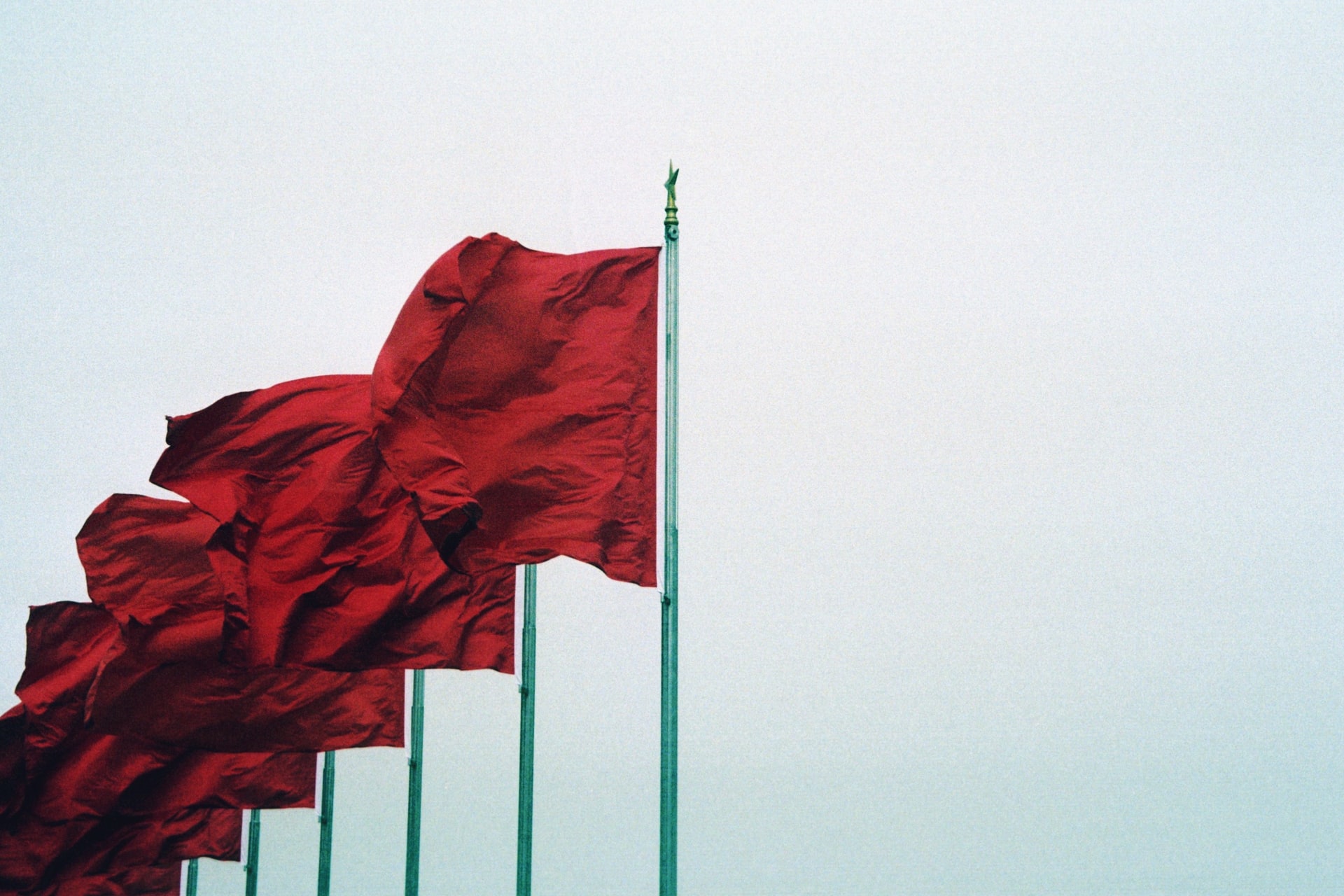
General Milley Told Chinese He'd Warn Them of Any U.S. Attack, says Book
Former President Donald Trump said recently that the Joint Chiefs of Staff chairman, General Mark Milley, committed treason if he contacted a top Chinese military official during the final few months of the Trump presidency.
 redstateamerica.com
redstateamerica.com
TKO
Veteran Member
All taking full advantage of our feckless traitorous paid off leader.Taiwan reports nine Chinese aircraft in its air defence zone
Reuters
1 minute read
TAIPEI, Feb 24 (Reuters) - Taiwan's air force scrambled again on Thursday to warn away nine Chinese aircraft that entered its air defence zone, Taiwan's defence ministry said, on the same day that Russia invaded Ukraine.
The ministry said eight Chinese J-16 fighters and one Y-8 reconnaissance aircraft were involved, which flew in an area to the northeast of the Taiwan-controlled Pratas Islands at the top end of South China Sea.
Taiwan has complained of regular such missions by the Chinese air force for the last two years or so, though the aircraft do not get close to Taiwan itself.
/cloudfront-us-east-2.images.arcpublishing.com/reuters/CIIPTJ4E7ZK4BL3UOXTF3RYEBA.jpg)
Taiwan warns Chinese aircraft in its air defence zone
Taiwan's air force scrambled again to warn away nine Chinese aircraft, as Taipei closely watches the Ukraine crisis.www.reuters.com
jward
passin' thru
Taiwan Foreign Minister Calls US Help Critical to Deterring War with China
February 24, 2022 7:33 AM
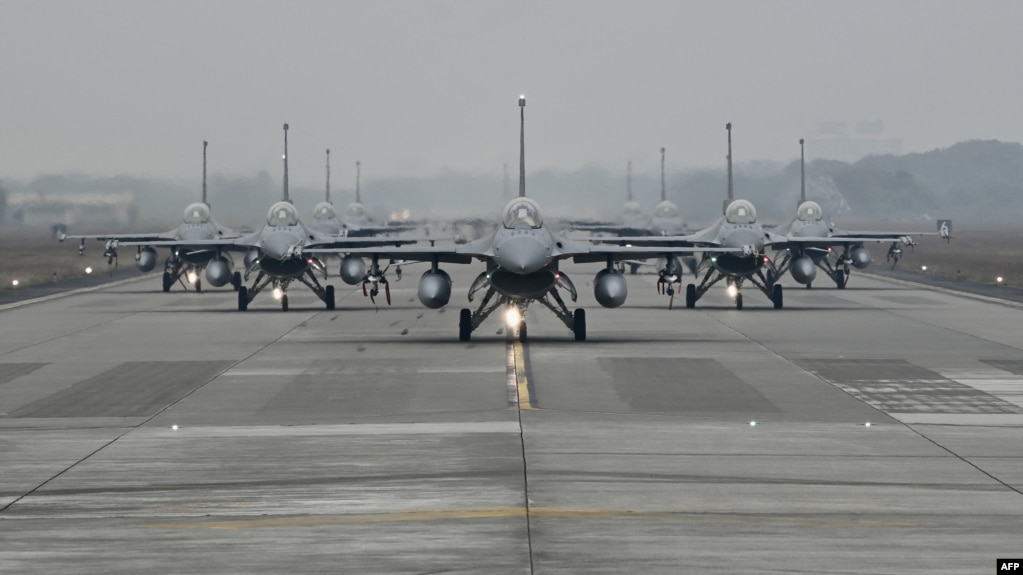
FILE - US-made F-16V fighters taxi on the runway at an air force base in Chiayi, southern Taiwan, Jan. 5, 2022.
TAIPEI, TAIWAN —
As Taiwan continues to face a military threat from China, Foreign Minister Joseph Wu said this week the Taiwanese government continues to focus on its “asymmetric defense” capability — including U.S. assistance — to make it an unattractive target, despite its limited military power.
Taiwan’s current strategy is to make certain “China will understand it will pay a very heavy price if it initiates conflict against Taiwan,” Wu said during a virtual event hosted by the McCain Institute for International Leadership at Arizona State University.
Speaking with former U.S. Secretary of Defense Mark Esper, Wu argued for continued U.S. support of Taiwan through arms sales, military exchanges, shared intelligence, and freedom of navigation exercises in the Taiwan Strait.

FILE - Taiwan Foreign Minister Joseph Wu holds a speech during his visit to Czech Senate in Prague, Czech Republic, Oct. 27, 2021.
“We want the people here in Taiwan to be able to defend themselves if China is going to launch a war against Taiwan,” Wu said.
Taiwan has lived under the threat of military action by China since China’s Nationalist Party, the Kuomintang fled the mainland after losing the Chinese civil war in 1949. While the conflict has remained largely a stalemate since then — with Beijing continuing to claim Taiwan as a province — an aggressive military modernization campaign by China means it could be able to attack Taiwan as early as 2027, according to the U.S. Defense Department.
Wu said China could have the potential to attack targets other than Taiwan in the future.

"China has made so much investment and have modernized their military capable of not only striking at Taiwan but go beyond the first island chain, so we need to develop our asymmetric warfare so that Taiwan is able to defend itself,” he said, referring to the name of the defensive barrier of Taiwan, Japan, Okinawa, and the northern Philippines.
Similar concerns have led the United States as well as France, Japan, Australia, India, South Korea, the Philippines, and the European Union to become more vocal about the future of Indo-Pacific security in the face of a rising China. Earlier this month, Washington released its latest Indo-Pacific strategy, which called for greater cooperation with regional partners.
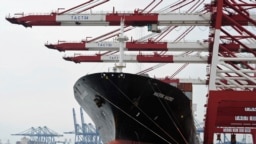
SEE ALSO: US Indo-Pacific Strategy Short on Trade Incentives, Experts Say
Wu said Taiwan must be “very careful” to not provoke China and trigger a conflict. The most recent incident occurred in 1995 and 1996, when China fired missiles toward Taiwan ahead of its first democratic elections. Future triggers could include a formal declaration of independence by Taiwan from China, which is why leaders such as President Tsai Ing-wen are extremely careful when they discuss Taiwan’s political status.
Wu said domestic problems could also force Beijing’s hand if it needed to unite China against a common enemy. “We also need to watch out for this classical theory about authoritarian countries. They like to divert domestic attention by initiating external conflict. If something is happening in China, inside their country, for example, economic slowdown, unemployment, or major disasters, things like that, that might be the time that we need to watch very carefully,” he said.

SEE ALSO: Taiwan Rebukes China Over Record Fighter Jet Incursion
In the meantime, Taiwan continues to face Chinese efforts to sway public opinion and destroy morale from within Taiwan by convincing civilians “democracy is doomed.” Tactics have included more than 1,000 Chinese People’s Liberation Army air sorties toward Taiwan last year, Wu said, as well as disinformation campaigns and political infiltration.
Wu said these tactics are “below the thresholds of a military conflict” but still require Taiwan and allies such as the United States to keep pushing back.
Events like Wu’s talk at the McCain Institute are part of Taiwan’s greater public relations strategy to remain a central concern for both the U.S. government and the U.S. public, said Kitsch Liao Yen-fan, a cyber and military affairs consultant at the Taiwanese civil society group Doublethink Lab.
Liao said this was a particular concern for Taiwan after the U.S. withdrawal from Afghanistan last year, as the U.S. public may not want to see its military send troops to another foreign conflict. While the United States is not formally committed to defending Taiwan if it were attacked, under the 1979 Taiwan Relations Act it has pledged to help it defend itself.
Whether this would ever extend to sending U.S. personnel to Taiwan in a wartime scenario, however, is still a topic of debate — and a decision that Taipei hopes to influence.
Talks like those by Wu, however, “create sufficient momentum to tip public opinion on Taiwan’s side, and on the political side of the United States to reach a tipping point where the willingness to actually send the military into the next conflict will be reversed again,” said Liao.
Related
You may also like
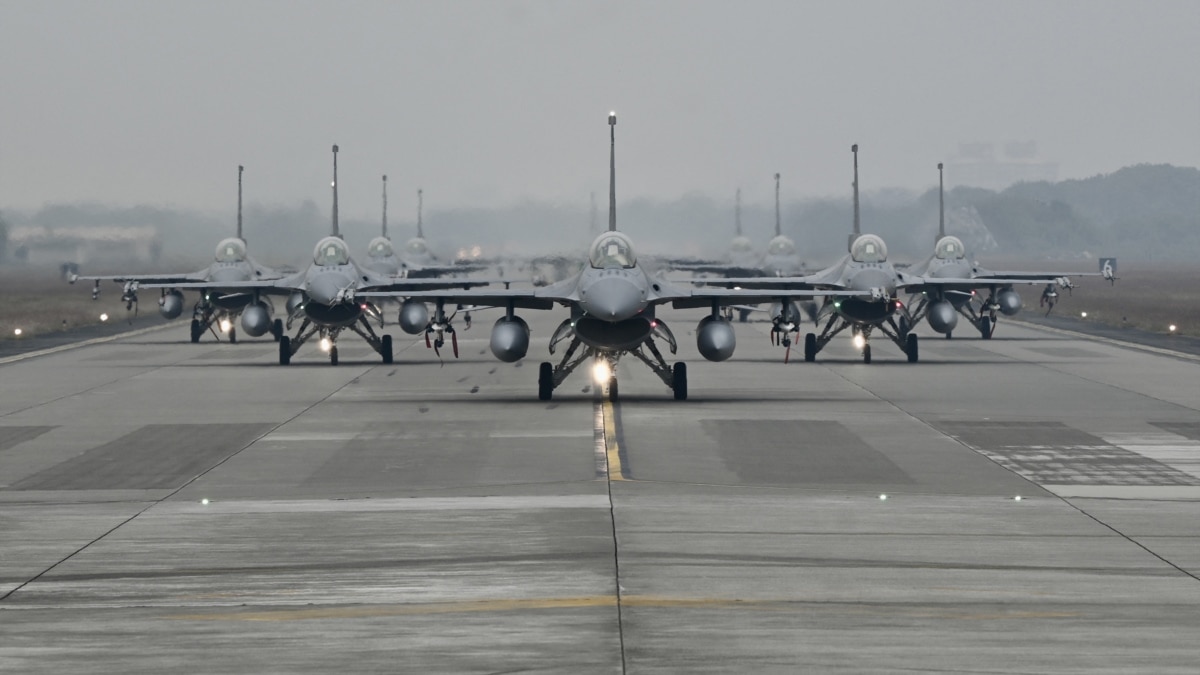
 www.voanews.com
www.voanews.com
February 24, 2022 7:33 AM

FILE - US-made F-16V fighters taxi on the runway at an air force base in Chiayi, southern Taiwan, Jan. 5, 2022.
TAIPEI, TAIWAN —
As Taiwan continues to face a military threat from China, Foreign Minister Joseph Wu said this week the Taiwanese government continues to focus on its “asymmetric defense” capability — including U.S. assistance — to make it an unattractive target, despite its limited military power.
Taiwan’s current strategy is to make certain “China will understand it will pay a very heavy price if it initiates conflict against Taiwan,” Wu said during a virtual event hosted by the McCain Institute for International Leadership at Arizona State University.
Speaking with former U.S. Secretary of Defense Mark Esper, Wu argued for continued U.S. support of Taiwan through arms sales, military exchanges, shared intelligence, and freedom of navigation exercises in the Taiwan Strait.

FILE - Taiwan Foreign Minister Joseph Wu holds a speech during his visit to Czech Senate in Prague, Czech Republic, Oct. 27, 2021.
“We want the people here in Taiwan to be able to defend themselves if China is going to launch a war against Taiwan,” Wu said.
Taiwan has lived under the threat of military action by China since China’s Nationalist Party, the Kuomintang fled the mainland after losing the Chinese civil war in 1949. While the conflict has remained largely a stalemate since then — with Beijing continuing to claim Taiwan as a province — an aggressive military modernization campaign by China means it could be able to attack Taiwan as early as 2027, according to the U.S. Defense Department.
Wu said China could have the potential to attack targets other than Taiwan in the future.

"China has made so much investment and have modernized their military capable of not only striking at Taiwan but go beyond the first island chain, so we need to develop our asymmetric warfare so that Taiwan is able to defend itself,” he said, referring to the name of the defensive barrier of Taiwan, Japan, Okinawa, and the northern Philippines.
Similar concerns have led the United States as well as France, Japan, Australia, India, South Korea, the Philippines, and the European Union to become more vocal about the future of Indo-Pacific security in the face of a rising China. Earlier this month, Washington released its latest Indo-Pacific strategy, which called for greater cooperation with regional partners.

SEE ALSO: US Indo-Pacific Strategy Short on Trade Incentives, Experts Say
Wu said Taiwan must be “very careful” to not provoke China and trigger a conflict. The most recent incident occurred in 1995 and 1996, when China fired missiles toward Taiwan ahead of its first democratic elections. Future triggers could include a formal declaration of independence by Taiwan from China, which is why leaders such as President Tsai Ing-wen are extremely careful when they discuss Taiwan’s political status.
Wu said domestic problems could also force Beijing’s hand if it needed to unite China against a common enemy. “We also need to watch out for this classical theory about authoritarian countries. They like to divert domestic attention by initiating external conflict. If something is happening in China, inside their country, for example, economic slowdown, unemployment, or major disasters, things like that, that might be the time that we need to watch very carefully,” he said.

SEE ALSO: Taiwan Rebukes China Over Record Fighter Jet Incursion
In the meantime, Taiwan continues to face Chinese efforts to sway public opinion and destroy morale from within Taiwan by convincing civilians “democracy is doomed.” Tactics have included more than 1,000 Chinese People’s Liberation Army air sorties toward Taiwan last year, Wu said, as well as disinformation campaigns and political infiltration.
Wu said these tactics are “below the thresholds of a military conflict” but still require Taiwan and allies such as the United States to keep pushing back.
Events like Wu’s talk at the McCain Institute are part of Taiwan’s greater public relations strategy to remain a central concern for both the U.S. government and the U.S. public, said Kitsch Liao Yen-fan, a cyber and military affairs consultant at the Taiwanese civil society group Doublethink Lab.
Liao said this was a particular concern for Taiwan after the U.S. withdrawal from Afghanistan last year, as the U.S. public may not want to see its military send troops to another foreign conflict. While the United States is not formally committed to defending Taiwan if it were attacked, under the 1979 Taiwan Relations Act it has pledged to help it defend itself.
Whether this would ever extend to sending U.S. personnel to Taiwan in a wartime scenario, however, is still a topic of debate — and a decision that Taipei hopes to influence.
Talks like those by Wu, however, “create sufficient momentum to tip public opinion on Taiwan’s side, and on the political side of the United States to reach a tipping point where the willingness to actually send the military into the next conflict will be reversed again,” said Liao.
Related
-

US Announces Steps to Bolster Critical Mineral Supply Chain -

50 Years after Nixon Visit, US-China Ties as Fraught as Ever -

Why a Russian Invasion of Ukraine Would Hurt China, Too -

Taiwan Ranks Among Top 10 Democracies in Annual Index
-

Hong Kong Invokes Emergency Powers Amid Unprecedented COVID-19 Case Numbers -

Taiwan Foreign Minister Calls US Help Critical to Deterring War with China
- Australia’s Antarctic Plans Anger China
- Hong Kong Rolls Out COVID Vaccine Passport, Paves Way For Mainland Doctors
- China Expands Influence in Central America
-

New series 52 Documentary
You may also like

Taiwan Foreign Minister Calls US Help Critical to Deterring War with China
Foreign Minister Joseph Wu stumps for further US support to make it an unattractive target to Beijing
 www.voanews.com
www.voanews.com
jward
passin' thru
The exersions are normal for quite a while now, and 9 is not really that many.
There were almost 30, or was it 40, back when that sub of ours hit whatever it didn't hit, doing whatever it wasn't doing.
There were almost 30, or was it 40, back when that sub of ours hit whatever it didn't hit, doing whatever it wasn't doing.
All taking full advantage of our feckless traitorous paid off leader.
jward
passin' thru
國防部 Ministry of National Defense, R.O.C.
@MoNDefense
·11h7
PLA aircraft (Y-8 ASW, J-16*4 and J-10*2) entered #Taiwan’s southwest ADIZ on February 28, 2022. Please check our official website for more information: 中華民國國防部-全球資訊網-即時軍事動態
@MoNDefense
·11h7
PLA aircraft (Y-8 ASW, J-16*4 and J-10*2) entered #Taiwan’s southwest ADIZ on February 28, 2022. Please check our official website for more information: 中華民國國防部-全球資訊網-即時軍事動態
jward
passin' thru
Ya know, I’m really getting tired of some asshole threatening us with war, and all sorts of shit…
OA
jward
passin' thru
國防部 Ministry of National Defense, R.O.C.
@MoNDefense
·9
6 PLA aircraft (KJ-500 AEW&C, Y-8 EW, J-16*2, Z-9 ASW and Y-8 ASW) entered #Taiwan’s southwest ADIZ on March 1, 2022. Please check our official website for more information: 中華民國國防部-全球資訊網-即時軍事動態
View: https://twitter.com/MoNDefense/status/1498626077341937666?s=20&t=RbVNPSOmeZ6iYJz4Cu9kNg
@MoNDefense
·9
6 PLA aircraft (KJ-500 AEW&C, Y-8 EW, J-16*2, Z-9 ASW and Y-8 ASW) entered #Taiwan’s southwest ADIZ on March 1, 2022. Please check our official website for more information: 中華民國國防部-全球資訊網-即時軍事動態
View: https://twitter.com/MoNDefense/status/1498626077341937666?s=20&t=RbVNPSOmeZ6iYJz4Cu9kNg
danielboon
TB Fanatic
does anyone still doubt Duduman 
EndGameWW3
@EndGameWW3
China warns US of 'heavy price' for backing Taiwan's independence

EndGameWW3
@EndGameWW3
China warns US of 'heavy price' for backing Taiwan's independence
Calling Putin? Putin??
jward
passin' thru
Insider Paper
@TheInsiderPaper
1m
BREAKING: Mike Pompeo says US should immediately recognize Taiwan as a sovereign and free country
@TheInsiderPaper
1m
BREAKING: Mike Pompeo says US should immediately recognize Taiwan as a sovereign and free country
does anyone still doubt Duduman
EndGameWW3
@EndGameWW3
China warns US of 'heavy price' for backing Taiwan's independence
They keep writing those checks, eventually someone is going to make them cash them.
Night Owl
Veteran Member
Flashback memory….I just remembered, back in September 2001, (days before 9/11) picture this: Tiananmen Square, Mao’s 3 story picture hanging up and hundreds of citizens practicing the entrance March for the 2008 Olympics (Chinese believe perfect doesn’t just happen unless you practice for 7 years and that’s how they plan every move they make).
Every major street had ‘lighted rainbows‘ from sidewalk over the road, except it had a jagged portion missing at the top, so the rainbow wasn’t connected as a whole rainbow. The Chinese people never stopped talking about how the rainbow would be complete when Taiwan returned to China. They were so proud they had Hong Kong and Macau back, but Taiwan was the missing piece to complete China Again.……just thought if was a missing trivia to be told.
Every major street had ‘lighted rainbows‘ from sidewalk over the road, except it had a jagged portion missing at the top, so the rainbow wasn’t connected as a whole rainbow. The Chinese people never stopped talking about how the rainbow would be complete when Taiwan returned to China. They were so proud they had Hong Kong and Macau back, but Taiwan was the missing piece to complete China Again.……just thought if was a missing trivia to be told.

